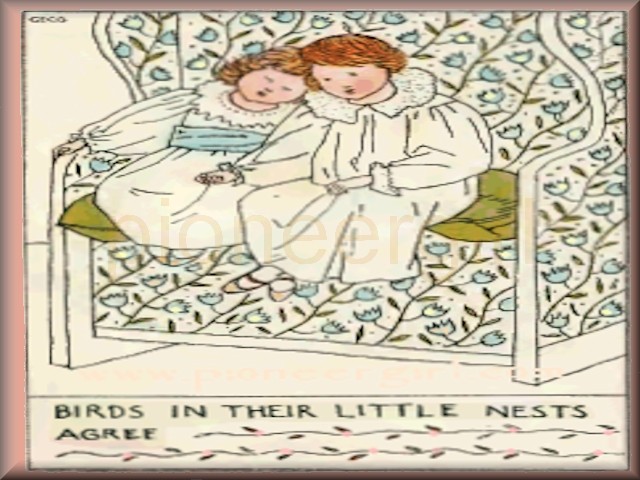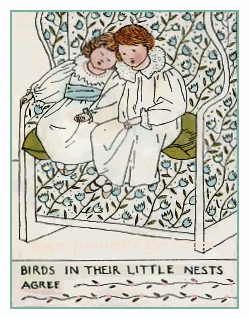birds in their little nests agree

Saying used by Eliza Jane Wilder as teacher, when trying to get students to behave.
 “Birds in their little nests agree ,” she said, smiling, and Laura and Ida almost squirmed from embarrassment. – Little Town on the Prairie, Chapter 14, “Sent Home From School”
“Birds in their little nests agree ,” she said, smiling, and Laura and Ida almost squirmed from embarrassment. – Little Town on the Prairie, Chapter 14, “Sent Home From School”
 In Laura Ingalls Wilder’s Little Town on the Prairie (see Chapter 14, “Sent Home from School”), Eliza Jane Wilder tries to keep order in an increasingly disorderly classroom, smiling and telling the unruly students that she knows the students liked her and she likes them, because, “Birds in their little nests agree.” Laura and Ida “almost squirmed from embarrassment.” Other than the fact that little birds usually don’t get along in the nest, why would the big girls be embarrassed?
In Laura Ingalls Wilder’s Little Town on the Prairie (see Chapter 14, “Sent Home from School”), Eliza Jane Wilder tries to keep order in an increasingly disorderly classroom, smiling and telling the unruly students that she knows the students liked her and she likes them, because, “Birds in their little nests agree.” Laura and Ida “almost squirmed from embarrassment.” Other than the fact that little birds usually don’t get along in the nest, why would the big girls be embarrassed?
The saying, “Birds in their little nests agree” would have been quite familiar to Laura and Ida, both raised in Congregational Sabbath School classes. Isaac Watts’ Divine and Moral Songs for Children was definitely used as part of the Sunday School curriculum in Minnesota churches in the 1870s when Laura attended Sunday School in Walnut Grove. Believing that moral lessons could be memorized easily when sung in verse to the tune of popular hymns – then reflected upon at quiet times during the day – Watts wrote his little volume at the request of a friend. It was suitable for children of all ages, but was meant for very young children only.
At the time of Little Town on the Prairie there had been published discussions about the use of such songs, especially the current practice some teachers had of breaking the verse into couplets as if that was the complete thought. Imagine Laura and Ida laughing over just the first two lines of Verse 2 below!
Song 17 is about the love that should be shown between brothers and sisters:
1. Whatever brawls disturb the street,
There should be peace at home;
Where sisters dwell, and brothers meet,
Quarrels should never come.
2. Birds in their little nests agree;
And ’tis a shameful sight,
When children of one family
Fall out, and chide, and fight.
3. Hard names at first, and threatening
They are but noisy breath,
May grow to clubs and naked swords,
To murder and to death.
4. The devil tempts one mother’s son,
To rage against another;
So wicked Cain was hurried on
‘Till he had kill’d his brother.
5. The wise will let their anger cool,
At least before ’tis night;
But in the bosom of a fool,
It burns till morning light.
6. Pardon, O Lord, our childish rage,
Our little brawls remove;
That, as we grow of riper age,
Our hearts may all be love.

“Birds in their little nests agree” (LTP 14)

